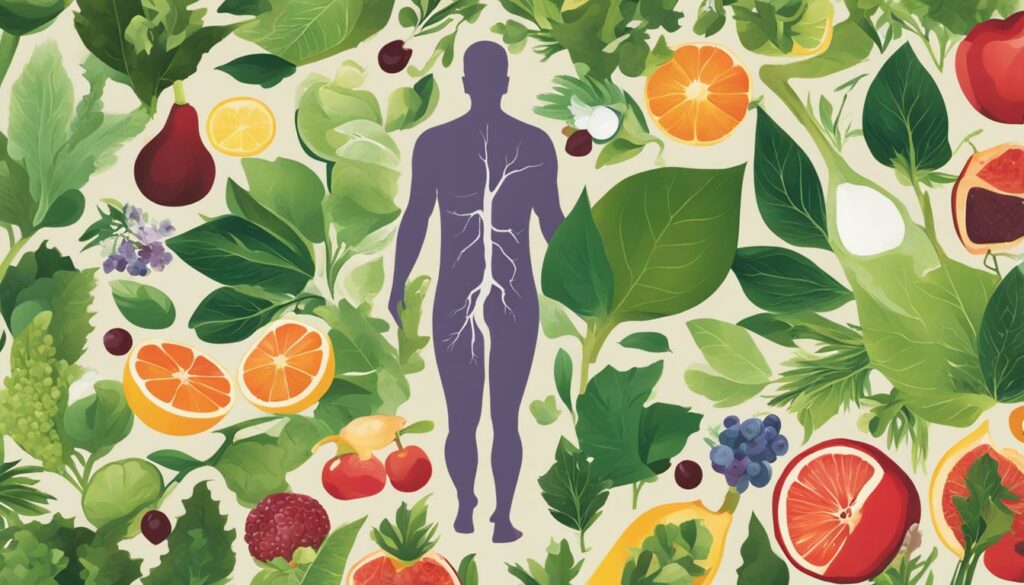Detox diets have become increasingly popular as a way to cleanse the body and improve overall health. Many individuals are seeking natural remedies and a holistic approach to enhance their sexual wellness.
While detox diets may not be the ultimate solution, understanding the body’s detoxification system can shed light on its importance for reproductive health.
The body’s natural detoxification process involves multiple organs, such as the liver, kidneys, and skin. These organs work together to eliminate toxins and maintain optimal health.
While detox diets lack clinical evidence to support their effectiveness, adopting a balanced diet and limiting exposure to toxic substances can support the body’s natural detoxification processes and promote sexual wellness.
Key Takeaways:
- Detox diets have gained popularity as a means to cleanse the body.
- While detox diets lack clinical evidence, supporting the body’s natural detoxification system is essential.
- A balanced diet and lifestyle can promote sexual wellness and overall well-being.
- Consult with a healthcare professional before starting any detox program, especially if taking medications.
- Focus on a holistic approach to enhance sexual wellness, rather than relying solely on detox diets.
Understanding the Body’s Detoxification System
The body’s detoxification system is a complex process that involves various organs and metabolic pathways. The primary goal of this system is to eliminate toxins and harmful substances from the body, promoting overall health and well-being.
One of the key organs involved in detoxification is the liver, which plays a crucial role in processing and filtering toxins.
Detoxification occurs through a process called biotransformation, where toxic substances are chemically altered to facilitate their excretion from the body.
This process involves two main phases: the first phase involves the conversion of toxins into intermediate metabolites, while the second phase involves further modification of these metabolites to facilitate their elimination.
Toxins can enter the body through various sources, including environmental pollutants, medications, and chemicals in food and water. Additionally, the body produces its own metabolic waste as a result of normal physiological processes.
Without an efficient detoxification system, toxins can accumulate in the body and impair its normal functioning.
“The body’s detoxification system is vital for maintaining optimal health and preventing the buildup of harmful substances.”
Detox diets are often marketed as a way to optimize the body’s natural detoxification system and promote toxin elimination. However, it’s important to note that most detox diets lack scientific evidence to support their claims.
While certain foods and supplements may have detoxifying properties, there is no need to follow a specific detox program to support your body’s natural detoxification processes.
A well-balanced diet that includes plenty of fruits, vegetables, whole grains, and lean proteins can provide the necessary nutrients for optimal detoxification. Drinking an adequate amount of water and engaging in regular physical activity can further support the body’s detoxification system.
When it comes to reproductive health, maintaining a healthy detoxification system is essential. Toxins and harmful substances in the body can have a negative impact on reproductive organs and hormonal balance.
By promoting overall detoxification through a nutritious diet and a healthy lifestyle, individuals can support their reproductive health and enhance their overall well-being.

In the next section, we will explore the effectiveness and safety of detox diets and shed light on their potential side effects and limitations.
The Effectiveness and Safety of Detox Diets
Despite the claims made by detox diet creators and proponents, there is a lack of clinical evidence to support the effectiveness and safety of most detox programs. These programs often involve extreme practices such as long periods of fasting, severe calorie restriction, and the use of herbal supplements.
Some detox diets even promote potentially dangerous practices like self-administered coffee enemas.
Self-administered coffee enemas, in particular, have been associated with severe side effects and, in some cases, fatalities. Detox diets that lack essential nutrients like protein and fiber can also negatively impact the body’s ability to detoxify properly.
While certain supplements and foods may support the body’s natural detoxification system, it is essential to consult with a healthcare professional before embarking on a detox program, especially if you are taking prescription medications.
“Despite the claims made by detox diet creators and proponents, there is a lack of clinical evidence to support the effectiveness and safety of most detox programs.”
It is important to consider the potential side effects and safety concerns associated with detox diets before starting any program. Consulting a healthcare professional can provide guidance and ensure that the detox program is appropriate for your individual needs and medical history.
The Dangers of Self-Administered Coffee Enemas
One specific practice commonly associated with detox diets is self-administered coffee enemas. While proponents claim that coffee enemas can enhance detoxification and support overall health, there are significant safety concerns and potential side effects to consider.
Coffee enemas involve inserting a mixture of coffee and water into the rectum to stimulate the liver and promote detoxification. However, this practice can lead to severe complications, including electrolyte imbalances, dehydration, infections, and even perforation of the rectum or colon.
There have been reported cases of hospitalizations and fatalities resulting from coffee enema-related complications.
Given these risks, it is crucial to avoid self-administered coffee enemas and opt for safer methods to support the body’s natural detoxification instead.
Protein and Fiber Deficiencies in Detox Diets
Many detox diets restrict the intake of certain food groups, including those that provide essential nutrients like protein and fiber. These restrictions can have negative consequences for the body’s ability to detoxify properly.
Protein is necessary for the production of enzymes involved in detoxification, while fiber supports the elimination of toxins through the digestive system. Lack of adequate protein and fiber can hinder the body’s natural detoxification processes, leading to potential imbalances and impairments in overall health.
It is essential to maintain a balanced diet that includes protein and fiber-rich foods to support the body’s natural detoxification system.
| Potential Side Effects of Detox Diets | Safe Practices to Support Detoxification |
|---|---|
|
|
Please consult a healthcare professional before making any significant changes to your diet or starting a detox program.
The Benefits of Detox for Overall Wellness
While detox diets may not have proven effectiveness or safety, there are several associated benefits for overall wellness. Many individuals report weight loss, increased energy levels, improved concentration, and enhanced emotional well-being after completing a detox program.
Detoxing allows for a reset of dietary habits and encourages healthier lifestyle choices, leading to these positive outcomes.
One of the notable advantages of detoxing is weight loss. By eliminating processed foods and focusing on whole, nutrient-dense options, individuals may experience a reduction in body weight.
A balanced detox diet often consists of fruits, vegetables, lean proteins, and healthy fats, promoting weight loss through calorie control and improved nutrient intake.
Detox programs are also known to provide increased energy levels. By removing toxic substances and inflammatory foods from the diet, the body can focus on essential metabolic processes and cellular repair. This renewed energy can lead to improved productivity, better physical performance, and an overall sense of vitality.
Furthermore, detoxing can have a positive impact on concentration and mental clarity. By eliminating processed sugars, artificial additives, and caffeine, individuals may experience reduced brain fog and improved cognitive function.
A clean, nourishing diet supports brain health and optimal neurotransmitter production, thus enhancing focus and mental performance.
Emotional well-being is another aspect positively influenced by detox programs. A nutrient-dense diet rich in vitamins, minerals, and antioxidants can help combat inflammation and oxidative stress, which are known contributors to mental health issues.
By reducing these harmful factors, individuals may experience improved mood and increased resilience to stress.
Additionally, detoxing may lead to healthier hair and skin. Nutrient-rich foods support the growth and vitality of hair and promote a clear, glowing complexion. Furthermore, detoxing can help slow down the aging process by reducing DNA degeneration caused by stress and inflammation.

In summary, while specific detox programs may lack scientific evidence, the associated benefits for overall wellness cannot be disregarded. Weight loss, increased energy, improved concentration, and enhanced emotional well-being are commonly reported outcomes of detoxing.
These favorable results can be achieved through a balanced diet and lifestyle changes without the need for a specific detox program.
Conclusion
Detox diets have gained popularity as a means to cleanse the body and improve overall health. However, it is important to note that most detox programs lack clinical evidence to support their effectiveness and safety.
While a balanced diet and lifestyle are important for the body’s natural detoxification system, there is no need to follow a specific detox program.
Supporting the body’s natural detoxification processes can be achieved through a nutrient-dense diet, limiting exposure to toxic substances, and maintaining a healthy lifestyle. These practices can not only promote overall well-being but also contribute to sexual health.
Taking proactive measures to support your body’s natural detoxification system can help ensure optimal sexual wellness.
It is crucial to consult with a healthcare professional before starting any detox program, especially if you have underlying health conditions or are taking medications. They can provide personalized guidance and help you navigate through the various detox options available, ensuring that your approach aligns with your specific needs and overall health goals.
FAQ
Are detox diets effective for improving sexual health?
Detox diets lack clinical evidence to support their effectiveness for improving sexual health. However, following a balanced diet and limiting exposure to toxic substances can support the body’s natural detoxification processes, which can promote sexual wellness.
How does the body’s detoxification system work?
The body’s detoxification system involves multiple organs, such as the liver, kidneys, and skin. These organs work together to eliminate toxins through biotransformation, where toxic substances are chemically altered and excreted from the body. Detoxification is important for maintaining optimal reproductive health.
Are detox diets safe?
Detox diets often lack scientific evidence to support their safety. Some detox programs involve extreme fasting, calorie restriction, or the use of herbal supplements, which can be potentially dangerous.
Self-administered coffee enemas, in particular, have been linked to severe side effects and fatalities. It is important to consult with a healthcare professional before starting any detox program, especially if you are taking prescription medications.
What are the benefits of detox for overall wellness?
While detox diets may not have proven effectiveness or safety, many individuals report benefits such as weight loss, increased energy levels, improved concentration, and emotional well-being after completing a detox program.
Detoxing can also lead to healthier hair and skin and help slow down the aging process by reducing DNA degeneration caused by stress and inflammation.
Do I need to follow a specific detox program to support my body’s natural detoxification system?
No, following a specific detox program is not necessary to support the body’s natural detoxification system. A nutrient-dense diet, limited exposure to toxic substances, and a healthy lifestyle can promote sexual health and overall well-being.
It is important to consult with a healthcare professional before making any significant changes to your diet or lifestyle, especially if you have underlying health conditions or are taking medications.




